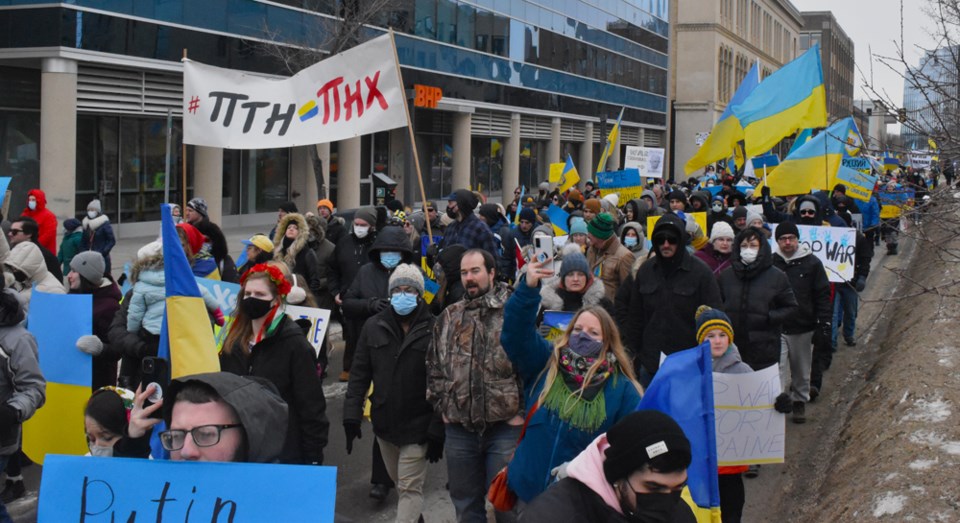SASKATOON — For almost two decades, NASHI has been helping to provide a haven to young girls in Ukraine who are often vulnerable targets of human traffickers.
The program provides a live-in centre they can call home until they finish post-secondary education.
Now the 17 girls under their care, and the seven staff, three of whom are working full time, will soon become refugees. They are to be evacuated to nearby Poland as fighting intensifies between the Ukrainian forces and the invading Russians.
NASHI, a Ukrainian word meaning “Ours” (Our Children, Our Responsibility), is a Saskatoon-based non-profit organization that helps fund \ Maple Leaf House in Stoyanov. The village is located in the area of the Oblast of Lviv and is 150 kilometres from the southern border of Belarus, whose leader Alexander Lukashenko is a known ally of Russian president Vladimir Putin.
For months, Russian troops amassed on the southern border of Belarus near Ukraine with officials from Moscow saying it was a training exercise before launching a full-scale attack on Thursday last week. The highway to the cities of Lviv and Lutsk goes through the village.
Thousands of Ukrainians have already fled to their nearby neighbours with the line crossing the Polish border more than 30 kilometres long.
Kyiv, the capital of Ukraine, has been experiencing heavy bombing from Russian artillery and is also about 400 kilometres away from Stoyanov. Russian troops have yet to reach Stoyaniv but Allsopp has told SASKTODAY.ca they are approaching.
“Things are very tense. The younger girls can still think of hiding in a safe room as a game. The older girls who understand better what is happening, are getting sick from the anxiety. Don't forget that these girls have already been traumatized and are still in the healing process at our house,” Allsopp told SASKTODAY.ca.
They also provided an update on NASHI’s Facebook page: “After much agonizing over the decision and hoping for a diplomatic solution, it looks like it’s time to leave our Maple Leaf House for a haven in Poland. The girls, who have come to our home for a safe and loving place, no longer feel safe there.
“Understandably, our girls are scared and extremely anxious. We feel we have to get them out. NASHI has secured all the necessary documentation and has a bus to transport the girls to Poland, where we have arranged a place for them to stay. Bags are packed in preparation for departure on short notice.”
Allsopp said getting the girls across the border to Poland is not going to be an issue, but getting them to Canada, if the need arises, is another story.
“We have finalized the needed permissions and documents. Getting into Poland will not be an issue. Getting into Canada is a whole level more complex, should that be needed. Visas need to be issued from Kyiv,” he added.
The Polish border is 60 kilometres away but the line to get past immigration officials could take days and NASHI officials don’t want the girls and their staff to stay on the bus that long. However, it is uncertain how long they will be staying in Poland since it all depends on the situation in Ukraine and if the war goes on there’s a possibility they would need to bring everyone to Canada.
For now, their fundraising efforts in Saskatoon continue as they are still determining the total cost of evacuating the girls and staff. A place to accommodate all of them in one facility once they enter Poland is also a hurdle.
“For Canada, the costs go up substantially. Simply flying to Toronto from Krakow in Poland would be close to $40,000 just for flights. Then flights to Saskatoon another $20,000 plus accommodation in Toronto while refugee status is cleared. Legal fees for immigration lawyers start to add up,” added Allsopp.
NASHI was formed in 2004 after the founders of the organization attended a presentation by Canadian journalist and author Victor Malarek on the topic of human trafficking. The organization’s initial focus was to educate and train girls who are exiting Ukraine’s orphanage system but has evolved into helping to prevent vulnerable girls from becoming human trafficking victims. It also helps those who were rescued to heal and there is a vocational school in the city of Lviv where girls and women could learn carpentry, sewing, information processing and cooking.
The girls were on a two-week school break. They have been using the break to take extensive English language classes in case they need to evacuate to Canada arose.



